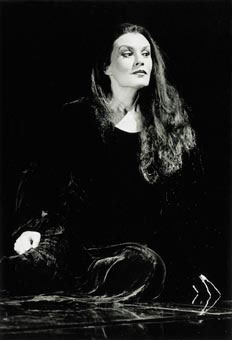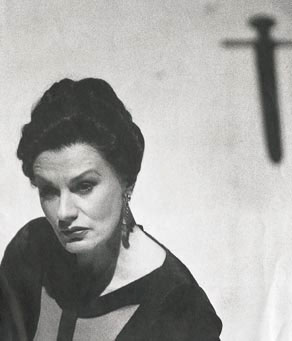stupidity plus --
I sometimes feel, both as someone who is interested in "classical" (notational) music, training to participate in opera, and who has had the bourgeoisie kind of education I've had, the pressure to either state that I am not an elitist or if acknowledging that, why it doesn't make me a horrible person (hee hee).
Case in point is finding ways to navigate certain declarative statements which have become so loaded (you're fat; you're stupid). As a result, I've come to discover that it's never dealing with someone who is less or not very intelligent. It's always some other quality that makes the lack of intelligence particularly annoying to suffer. It could be stupidity plus rudeness; it could be stupidity plus deceit; it could be stupidity plus laziness; whatever. It's stupidity plus, which transforms something which might not have been ideal into something that's clearly a negative.
Longwinded intro aside, it's just a lead-in for a different sort of "plus." Building on the thoughts I had last night and wrote about previously (mind contrasted with other ways of "thinking"), I ran into a passage from the book A Soprano on Her Head

discussing a certain physiological visualization as a learning/teaching/practicing technique. I was instantly reminded of many things, chiefly of: ACB's post on her visualization practice (also a "sweet!" at being blogrolled!), Renee Fleming's writings on the visualization and affirmation of success in The Inner Voice, and certain passages in Animals in Translation noting
So the upshot of all this is not only for vocal technical practice, by immersing the body in imagining and remembering physical feats solely through the mind, but also a window finally into an aspect of performance, both as a musician, and -- should I have the opportunity to learn -- as an actor. Having made these connections, the truthfulness of an over-used statement has finally sunk in. Regardless of how the body is put into its state of feeling, this state is real, genuine, and truthful. Although the mind may know that this is make believe, the body does not, nor does it care -- and it's eloquently illustrated for anyone who has ever known stage fright (the mind knows that it's unlikely to be eaten or killed, but the body is prepared to fight to the death or flee as if on wings).
And in finally taking these words, I realize that I had heard them repeatedly throughout life, though it never really took hold until now. One of the more eloquent times I heard it was in a portion of the really quite wonderful documentary DVD on Waltraud Meier, I Follow a Voice Within Me.


I even picked up a smattering of German watching it -- but now (curses!), I can't seem to be able to find my copy. oh noes :(
Case in point is finding ways to navigate certain declarative statements which have become so loaded (you're fat; you're stupid). As a result, I've come to discover that it's never dealing with someone who is less or not very intelligent. It's always some other quality that makes the lack of intelligence particularly annoying to suffer. It could be stupidity plus rudeness; it could be stupidity plus deceit; it could be stupidity plus laziness; whatever. It's stupidity plus, which transforms something which might not have been ideal into something that's clearly a negative.
Longwinded intro aside, it's just a lead-in for a different sort of "plus." Building on the thoughts I had last night and wrote about previously (mind contrasted with other ways of "thinking"), I ran into a passage from the book A Soprano on Her Head

discussing a certain physiological visualization as a learning/teaching/practicing technique. I was instantly reminded of many things, chiefly of: ACB's post on her visualization practice (also a "sweet!" at being blogrolled!), Renee Fleming's writings on the visualization and affirmation of success in The Inner Voice, and certain passages in Animals in Translation noting
- autism's link with lower-level brain-function and the author's personal linking of such brain-function to difficulty thinking in language and instead needing to think in images that goes beyond the "visual thinker/learner" catchphrase (I wonder if there's a universal grammar for such image-thinking)
- the suppression of visual memory by language
So the upshot of all this is not only for vocal technical practice, by immersing the body in imagining and remembering physical feats solely through the mind, but also a window finally into an aspect of performance, both as a musician, and -- should I have the opportunity to learn -- as an actor. Having made these connections, the truthfulness of an over-used statement has finally sunk in. Regardless of how the body is put into its state of feeling, this state is real, genuine, and truthful. Although the mind may know that this is make believe, the body does not, nor does it care -- and it's eloquently illustrated for anyone who has ever known stage fright (the mind knows that it's unlikely to be eaten or killed, but the body is prepared to fight to the death or flee as if on wings).
And in finally taking these words, I realize that I had heard them repeatedly throughout life, though it never really took hold until now. One of the more eloquent times I heard it was in a portion of the really quite wonderful documentary DVD on Waltraud Meier, I Follow a Voice Within Me.


I even picked up a smattering of German watching it -- but now (curses!), I can't seem to be able to find my copy. oh noes :(


3 comments:
I don´t know what you´re getting at with not being able to stand certain kinds of stupidity and then mentionning "A Soprano on her head" right after. Are you implying that is stupid plus something=intolerable?
I would be interested to know which of these books you could mostly highly recommend, myself being from an academic family and not having such a penchant for books.;-)
That being said, I can definitely relate to what you´re talking about. We struggle to be tolerant of others´ ignorance, but when they are arrogantly ignorant or mean and ignorant or crude and ignorant, our "elitism" steps in and we cannot deal. This is okay though. Without a certain amount of elitism, good classical music doesn´t have a chance!
Anon.!
Hmm, re-reading my post, I guess I didn't really elaborate on the connection in my mind. I was trying to observe a particular case of "the sum being more than total of its parts," e.g., not being very bright + deceitful is incredibly different from those two qualities separately.
Now that I consider it, I think I was also working from the assumption that the introduction of one to the other is an importantly different case from the reverse (chem analogy: adding water into a highly acidic solution is different from the reverse). Not sure if that's necessarily possible with personality traits -- I don't really believe that there is some divine personality chem lab.
I think a post that sort of skirts the superficial issue of elitism vs. stupidity (which is weird, since they aren't opposites, even in a non-Derridean viewpoint) is one by Standing Room Only:
clicky
Oh, so where was I? Oya, the point I had wanted to make was having had these disparate thoughts in this dislocated sources, their joining creates something different, yet still owing to each of the sources. Hmm, and now I think I need to add references to Bruno Latour now -- it really is just an avalanche of association now....(eee, run away!)
Ok so the sum being more than the total of its parts lead you to the concept of visualization, which is a part of a larger whole, very hard to fathom? Something along those lines?
Post a Comment